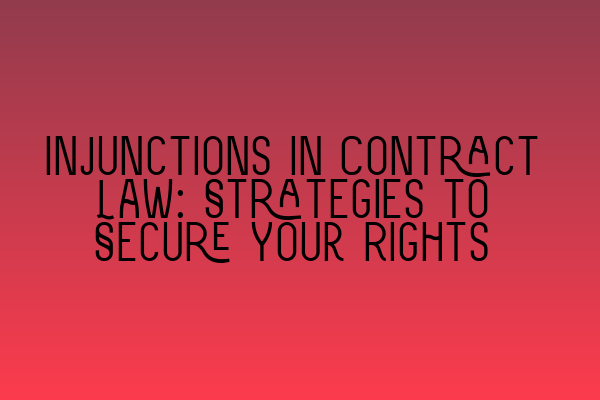Injunctions in Contract Law: Strategies to Secure Your Rights
Contracts are the backbone of business transactions, providing parties with legal rights and obligations. However, there are times when one party fails to fulfill their contractual duties, leading to a breach of contract. When this happens, the affected party may seek remedies to protect their interests and secure their rights. One powerful tool in contract law is an injunction.
What is an Injunction?
An injunction is a court order that requires a party to either perform a specific action or refrain from doing something. It can be used to prevent further harm or to compel a party to fulfill their contractual obligations. In contract law, injunctions play a significant role in resolving disputes and can provide an effective remedy for breaches of contract.
Types of Injunctions in Contract Law
There are two main types of injunctions that can be sought in contract law:
- Prohibitory Injunction: This type of injunction is used when a party wants to stop the other party from continuing with a particular action. For example, if Party A discovers that Party B is using their confidential information for unauthorized purposes, Party A can apply for a prohibitory injunction to prevent Party B from further using or disclosing the confidential information.
- Mandatory Injunction: A mandatory injunction is sought when a party wants the court to compel the other party to perform a specific action. For instance, if Party A has paid Party B to deliver goods by a certain date but Party B fails to do so, Party A can seek a mandatory injunction to require Party B to deliver the goods as promised.
Strategies to Secure Your Rights with an Injunction
When it comes to securing your contractual rights through an injunction, there are several key strategies to consider:
- Act Quickly: Time is of the essence when seeking an injunction. Any delay in applying for relief may weaken your case. The court may question whether the harm you allege is urgent enough to warrant an injunction. Therefore, it’s crucial to act swiftly to protect your rights.
- Provide Strong Evidence: To obtain an injunction, you must present strong evidence to support your claim. This includes demonstrating that you have a valid and enforceable contract, that the other party has breached the contract, and that you have suffered or will suffer irreparable harm as a result of the breach.
- Balance of Convenience: The court will consider the balance of convenience when deciding whether to grant an injunction. This means they will assess the potential harm to both parties if the injunction is granted or denied. You should present arguments that show the harm to you outweighs any harm the other party may face.
- Consider Alternative Remedies: In some cases, it may be more appropriate to seek alternative remedies, such as damages or specific performance, instead of or in addition to an injunction. Carefully assess your options and discuss them with your solicitor to determine the best course of action.
Conclusion
Injunctions can be powerful tools to secure your contractual rights and protect your interests. Whether you need to stop someone from continuing a harmful action or compel them to fulfill their obligations, an injunction can provide an effective remedy. By acting quickly, providing strong evidence, considering the balance of convenience, and exploring alternative remedies, you can strengthen your case and increase your chances of obtaining the desired outcome through an injunction.
For more information on contract law and other topics related to the Solicitors Qualifying Examination (SQE), check out these related articles:
- SQE Sample Papers: Practice for Exam Success
- Adjusting Strategy Based on Mock Performance: Improving Your Approach
- Strengthening Weak Areas in SQE: Targeted Practice for Improvement
- Effective Revision Techniques for SQE: Maximizing Retention and Recall
- Improving Speed and Accuracy in SQE: Tips for Efficient Exam Taking
